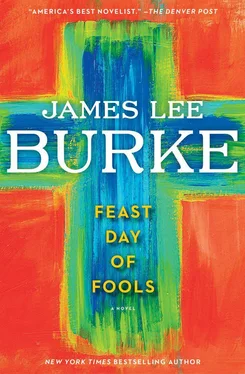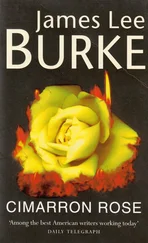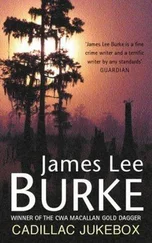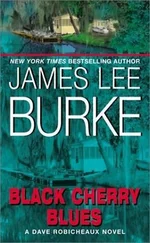James Burke - Feast Day of Fools
Здесь есть возможность читать онлайн «James Burke - Feast Day of Fools» весь текст электронной книги совершенно бесплатно (целиком полную версию без сокращений). В некоторых случаях можно слушать аудио, скачать через торрент в формате fb2 и присутствует краткое содержание. Жанр: Полицейский детектив, на английском языке. Описание произведения, (предисловие) а так же отзывы посетителей доступны на портале библиотеки ЛибКат.
- Название:Feast Day of Fools
- Автор:
- Жанр:
- Год:неизвестен
- ISBN:нет данных
- Рейтинг книги:4 / 5. Голосов: 1
-
Избранное:Добавить в избранное
- Отзывы:
-
Ваша оценка:
- 80
- 1
- 2
- 3
- 4
- 5
Feast Day of Fools: краткое содержание, описание и аннотация
Предлагаем к чтению аннотацию, описание, краткое содержание или предисловие (зависит от того, что написал сам автор книги «Feast Day of Fools»). Если вы не нашли необходимую информацию о книге — напишите в комментариях, мы постараемся отыскать её.
Feast Day of Fools — читать онлайн бесплатно полную книгу (весь текст) целиком
Ниже представлен текст книги, разбитый по страницам. Система сохранения места последней прочитанной страницы, позволяет с удобством читать онлайн бесплатно книгу «Feast Day of Fools», без необходимости каждый раз заново искать на чём Вы остановились. Поставьте закладку, и сможете в любой момент перейти на страницу, на которой закончили чтение.
Интервал:
Закладка:
“Those Thai women didn’t have any business in this country. Just like those Mexicans you’re bringing in. Every one of them is a breeder, wanting to have their babies here so they can be U.S. citizens.”
Anton Ling’s eyes were burning, her jaw clenched. She held her gaze on him as though watching a zoo creature behind a pane of glass. He stepped back, a twitch in his face. “Why you staring at me like that?”
“It had to do with a woman, didn’t it?” she said.
“What?”
“You hurt a woman very badly. Maybe even killed her. That’s it, isn’t it?”
“You spread lies about me, I’ll come down there and-”
“You’ll what?”
His face was contorted, his eyes hot and small and unfocused. “I just wanted to be your friend,” he said. “You’re putting Krill and that man Negrito on me while you’re walking around with your nose in the air like you’re some kind of female pope. La Magdalena, my cotton-picking ass.”
She got in the cab of her pickup and started the engine. “Don’t come around my home again. Don’t presume about whom you’re dealing with, either.”
“ Presume? What’s that supposed to mean?” he asked. “You gonna call the Chinese army down on me?”
She drove away without replying, her truck rattling and leaking smoke at every rusted seam.
“ Presume what?” he shouted after her.
Hackberry worked late that evening, and at dusk he removed his hat from the peg on his office wall and put it on and hung his gun belt and holstered white-handled revolver from his shoulder and drove out to the site where Jack Collins had machine-gunned the two PIs. The crime-scene tape that had been wrapped around the mesquite and yucca had been broken by wild animals, the brass cartridges from Collins’s gun picked up from the ground, the blood splatter washed from the rocks by the previous night’s rain, even the sandwich crumbs eaten by ants and the ants in all probability eaten by armadillos. Other than the broken yellow tape, impaled and fluttering among the creosote bush and agaves and prickly pear, there was little to indicate in the reddish-blue melt of the sunset that two men had pleaded for their lives on this spot less than thirty-six hours ago, their sphincters failing them, their courage draining through the soles of their feet, all their assumptions about their time on earth leached from their hearts, their last glimpse of the earth dissolving in a bloody mist.
What good purpose could lie in his visit to the site of an execution? he asked himself. Perhaps none. In reality, he knew why he was there, and the reason had little to do with the two gunshot victims. Hackberry had come to learn that wars did not end with a soldier’s discharge. The ordeal, if that was not too strong a word, was open-ended, an alpha without an omega, a surreal landscape lit by trip flares that could burst unexpectedly to life in the time it took to shut one’s eyes.
Hackberry had many memories left over from the war: the human-wave assaults; the. 30-caliber machine-gun barrels that had to be changed out with bare hands; the Chinese dead frozen in the snow as far as the eye could see; the constant blowing of bugles in the hills and the wind furrowing across the ice fields under a sky in which the sun was never more than a gaseous smudge. But none of these memories compared to a strip of film that he could not rip from his unconscious, or kill with alcohol or drugs or sex or born-again religion or psychotherapy or good works or sackcloth and ashes. He did not see the filmstrip every night, but he knew it was always on the projector, waiting to play whenever it wished, and when that happened, he would be forced to watch every inch of it, as though his eyelids were stitched to his forehead.
In the filmstrip, Sergeant Kwong would finish urinating through a sewer grate on Hackberry’s head, then extract him from the hole where, for six weeks, Hackberry had learned how to defecate in a GI helmet and survive on a diet of fish heads and weevil-infested rice. In the next few frames of the strip, Hackberry would stand woodenly in the cold, his body trembling, his eyelashes crusted with snow, while Kwong lifted his burp gun on its strap and fired point-blank into the faces of two prisoners from Hackberry’s shack, their bodies jackknifing backward into an open latrine.
They died and Hackberry lived. The other prisoners in his shack were also spared. But all of them were made to believe their comrades’ deaths were caused by them and their willingness to confess to imaginary conspiracies in order to free themselves from the holes in the ground where they shivered nightly.
If Hackberry had to face Sergeant Kwong’s burp gun again, would he be less fearful than the morning he had watched his fellow POWs executed, their hands lifting helplessly in front of their faces? If he met Kwong on a street, would he let the past remain in the past? Or would he call him out, as would his grandfather Old Hack, pistol-whipping Kwong to his knees?
Hackberry would never know the answer to those questions. Kwong had probably gone back home after the war and repaired bicycles or worked on a communal rice farm. With regularity, he had probably battered and impregnated a peasant girl he bought from a neighbor. He had probably treated his children with both fondness and cruelty while he watched them grow into imitations of himself. If he ever thought at all about the crimes he had committed in the Bean Camp, it was probably only to ask himself if he had been too lenient on the foreigners who had caused him to leave his home and serve in the frozen wastes of North Korea. He would probably be amazed that a lawman on the South Texas border did not go through one day or night in his life without thinking of him.
Hackberry walked to the top of the incline where the two PIs had died, his binoculars hanging from his neck. He gazed through the lenses at Anton Ling’s house and at the lightning rods on the peaked roof and at the gables and the wide gallery and the paintless weathered severity of the wood in the walls. The house reminded him of Old Hack’s place, a displaced piece of Victorian design dropped by happenstance on the Texas Plains, as though its picket fence and latticework and baroque cornices could end tornadoes and prairie fires and ice storms that froze a man to the saddle, or stop rogue Indians from rope-dragging white families through cactus or hanging them upside down over a slow flame.
He moved the lenses across Anton Ling’s gallery and the hanging baskets of impatiens and coffee cans planted with violets and petunias. Children were sitting on the wood steps, playing with a whirligig. A meat fire was smoking in the backyard, the windmill’s blades ginning, and Mexican families were sitting at the plank tables under the fruit trees by the barn. Then he saw her emerge from the back door, a straw basket on her arm, and begin setting the table with plastic forks and knives and paper plates and jelly glasses. She wore cowboy boots and a navy blue dress with a long brocaded hem and silver trim at the neck, one like his dead wife, Rie, would wear, adding to the effect of her dark features and the highlights in her hair. Then he saw the Mexicans bringing colored glass vessels from the chapel to the tables, candles flickering. The Mexicans were singing songs, the words rising and falling in the wind, their work-seamed faces exactly like those of the people who had always surrounded Rie. He had to take the binoculars from his eyes and sit down on a rock, a pang not unlike a sharp stone piercing his heart.
Was he so foolish that he would try to re-create his wife inside the skin of the Asian woman? Would he never learn to accept the world for what it was, a place where the sunlight blinded us to the figures beckoning to us from the shade?
Читать дальшеИнтервал:
Закладка:
Похожие книги на «Feast Day of Fools»
Представляем Вашему вниманию похожие книги на «Feast Day of Fools» списком для выбора. Мы отобрали схожую по названию и смыслу литературу в надежде предоставить читателям больше вариантов отыскать новые, интересные, ещё непрочитанные произведения.
Обсуждение, отзывы о книге «Feast Day of Fools» и просто собственные мнения читателей. Оставьте ваши комментарии, напишите, что Вы думаете о произведении, его смысле или главных героях. Укажите что конкретно понравилось, а что нет, и почему Вы так считаете.












